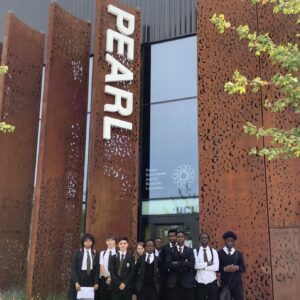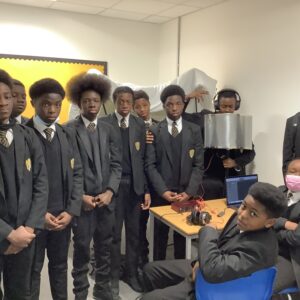Music
Welcome to the Music Department. Music at Eastbrook School develops knowledge, skills and application of these sequenced in a clearly delineated structure within the wider school ‘Character and Academics’ approach to curriculum. The activities used in music are creative and fun but can also be a highly challenging. Music enthuses and encourages a love and passion for the elements of music within the performing Arts and to become proficient in a variety and range of disciplines. The music curriculum aims to embed the necessary music skills, knowledge, application through communicating these through both practical and the evaluation of their own practical work. Through this process the pupils develop the virtues necessary to demonstrate and apply a high level of personal management skills when rehearsing performance skills. The pupils develop resilience, discipline, understanding as well as being open to feedback so at to improve and make progress when developing the skills and knowledge through applying these to their work. Pupils gain a coherent knowledge and understanding of the theories and practices used in the different styles and musical genres. Pupils are equipped to think critically and justify their reasoning when evaluating styles and genres of performances within the music industry.
The introduction of the New model music curriculum 2021 embeds the skills, knowledge and application necessary from key stage 1 to key stage 2 and 3 by clear sequenced and ambitious approach to music teaching. The curriculum provides a roadmap to introduce pupils to the disciplines and experiences through music, helping them to appreciate and understand the works of the musical giants of the past, while also equipping them with the technical skills and creativity to compose and perform. The drama curriculum embeds the skills, knowledge and application from the start of key stage 3 to the end. The curriculum provides a road map which introduces the pupils to the disciplines and experiences through drama, helping them to appreciate and understand the stylistic works, while also equipping them with the technical skills and creativity to devise and perform. The curriculum supports the ambitions, inclusivity and the development of character in the curriculum intent
Key stage 3
The key stage curriculum at key stage 3 develops singing, listening, composing, performing and instrumental performances through the use of the different styles and genres being explored as well as the development of composing different styles of music which embeds understanding and knowledge of these different styles and genres.
The students develop their practical skills in music and they are able to review and evaluate their progress as well as develop independence and resilience when developing the musical skills and techniques. The assessment structure is also designed so that pupils can build on what they have learnt through the studying of the different styles and genres so as and to develop these skills, as they move through each year.
The music curriculum supports the work completed at key stage 2 and builds on these skills and techniques the students already have and they further develop these as they move towards Key stage 4 readiness.
The music curriculum focuses on building of these skills and techniques and to show aptitude and improvement made through each year and allows the students to explore and experience the different ways in which music can be understood and demonstrated through knowledge, understanding and application.
Over a three-year development journey from year 7 through to year 9, pupils gain specific knowledge, understanding of the skills and techniques needed when singing, listening, composing, performing and instrumental performances. They will apply these skills and techniques in their practical work and develop these skills needed through workshops, rehearsals and performances. The pupils will reflect, review and evaluate the key features of each style and genre of music, through the development and acquisition of these skills and techniques which are used within each style and genre of music with ever increasing complexity and demonstrating the virtues that will enable them to be ready for KS4 with the knowledge, understanding and application of these, so as to set them up to achieve an expected standard by the end of their secondary school study.
Key stage 4
The key stage 4 curriculum encourages pupils to engage in the creative process and to develop as effective and independent learners. The pupils develop an inquiring mind through music and musicianship by becoming confident in taking risks and learning from experience through practice and rehearsal of ideas, processes, techniques and skills and also through reflecting back so as to understand through investigating, analysing, evaluating the practical work. The pupils through their study develop sector-specific knowledge and skills in a practical learning environment. The main focus is on four areas of equal importance, which cover the: development of key skills that prove learners’ aptitude in music such as responding to a musical brief using musical skills and techniques. The processes that underpin effective ways of working in the music industry, such as the development of musical ideas, and using skills and techniques for rehearsal and performance to respond to a music industry brief and the attitudes that are considered most important in the music industry, including personal management and communication, knowledge that underpins effective use of skills, processes and attitudes in the sector such as musical skills and styles. The Key stage 4 curriculum promotes deep learning through ensuring the connection between knowledge and practice. The components focus on: the development of core knowledge and understanding of music styles and techniques used in a range of music genres, and how to respond to a music industry brief the development and application of skills such as practical and interpretative, musical rehearsal and performance through workshops and classes, reflective practice through the development of skills and techniques that allow the pupils to think about the development of their idea from the initial plan to the final musical product.
The music course explores Music Products and Styles, Music Skills Development and Responding to a Commercial Music Brief. The drama course Explores the Performing Arts – get a taste of what it’s like to be a professional actor. The pupils will develop and understand how being disciplined, resilient, open and principled is essential in the pursuit of a career in the performing Arts and the music industry. Continuing to developing acting Skills and Techniques in the chosen discipline and Performing to a Brief – the pupils consider how practitioners adapt their skills for different contexts, and put this into practice in a performance. The pupils will show perseverance through developing and practicing their practical acting, music and playing skills and this will then develop confidence in their work and in their performances.
Curriculum enrichment
The department provides a range of opportunities that are offered to the students outside of normal timetabled day and these are choir, music tech, bands club and percussion club.
Homework
At key stage 3 the students consolidate key words, listening tasks and online musical platforms.
At Key stage 4 students create blogs of their practical work completed during workshop sessions.
Ways of supporting your progress
Private instrumental tuition
Attending concerts
Listening to/watching performances of a wide range of music online
Analysing the techniques and contribution of key practitioners in a variety of genres
Career Opportunities
The career opportunities are they can study Music at key stage 5 and then study the subject at university. They can become a musician and work in many areas of the music industry.
Useful websites
https://www.bbc.co.uk/bitesize/subjects/zmsvr82
https://www.bbc.co.uk/sounds
https://www.gov.uk/government/publications/teaching-music-in-schools
https://www.bbc.co.uk/bitesize/subjects/zmsvr82
https://www.bbc.co.uk/sounds
https://qualifications.pearson.com/en/qualifications/btec-tech-awards/music-practice.html
Exam Board
Pearson Edexcel BTEC Music Practice
Level 1/2 TECH AWARD Evidence is through both Portfolio and practical work which is internally verified and externally sampled and one component that is externally marked and set by Pearson. The external examination is through controlled written assessment and practical work and then it is marked by Pearson.



